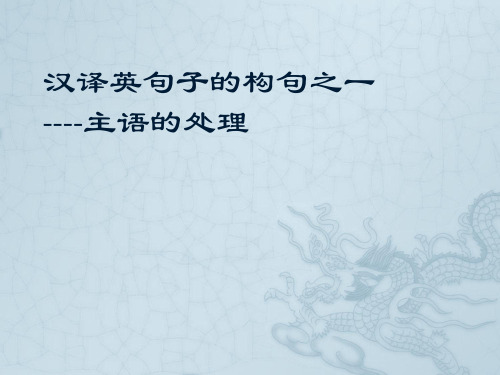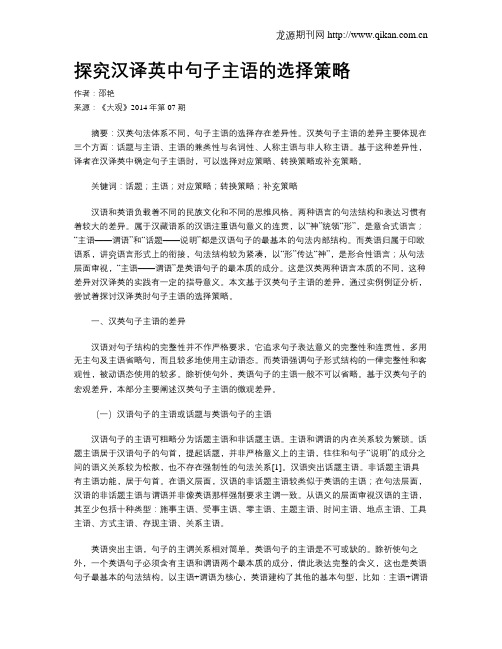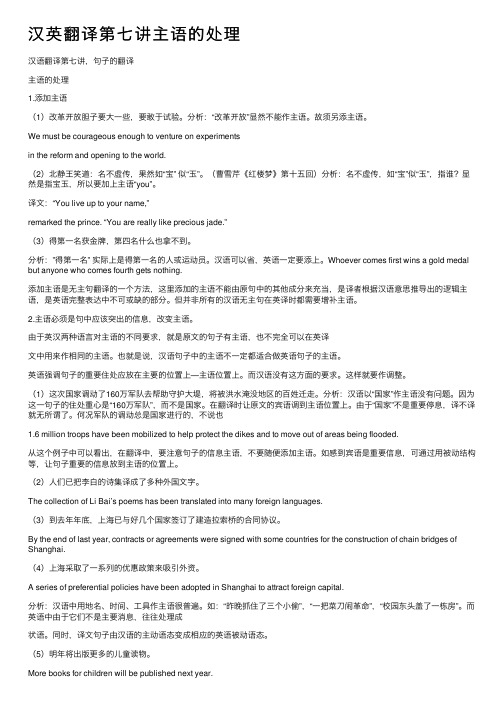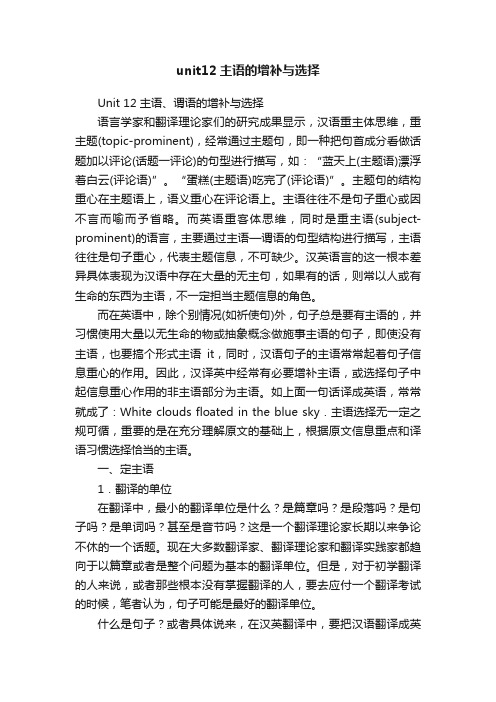汉译英时主语的添加与选择
汉译英主语的选择we

练习:
要实现统一,就要有个适当方式。 要坚持把教育放在优先发展的战略地位, 加快各级各类教育发展。
To achieve a peaceful unification, we must find a proper means. We need to make education a strategic priority and accelerate the development of all types of education at all levels.
主语与主题
--兼论主语的选择
练习
操作说明不应使用长词或复杂结构。 这本书整整写了两年了。 要多接触,增进了解。 一看到那棵大树,我便想起了童年的情 景。
Long words or complex constructions should not be used in instructions for operation./Instructions for operation should not use long words or complex constructions . This book took me two entire years to write./The writing of this book lasted two entire years.(?)/ It took me two entire years to write this book.(?) Let there be more contact for more understanding between the two sides. The sight of the big tree always reminds me of my childhood.
汉译英之主语的选择全解课件

在汉语中,无主句和省略主句是比较常见的句型,但在英语中,无主句和省略主句的使用相对较少。在汉译英中 ,需要根据英语的表达习惯对无主句和省略主句进行处理,可以采用增补主语、变换句型等方法,使得译文更加 符合英语的表达习惯,提高译文的准确性和流畅性。
汉译英主语选择的
03
方法与技巧
直译法
总结词
功能
主语在句子中起到引导句子的作 用,是句子逻辑和语义的核心, 同时影响谓语和宾语的语法结构 和意义。
主语选择的重要性
01
02
03
语法正确性
选择正确的主语可以使句 子语法结构完整,避免出 现语法错误。
语义清晰性
选择合适的主语可以明确 动作的执行者或状态的变 化者,使句子的语义更加 清晰。
语境适应性
详细描述
在汉译英过程中,有时候原文中的一些词汇或短语在英文中并不需要翻译出来,因为它 们对于句子的结构和意义没有实质性的影响。省略法可以在主语选择时使用,例如在翻
译一些重复的词汇或短语时,可以省略其中的一部分,以使译文更加流畅、自然。
汉译英主语的特殊
04
处理
主谓一致的处理
主谓一致是指英语句子中主语和谓语动词在数、时态和语态上保持一致。在汉译 英过程中,需要根据英语语法规则,选择适当的主语形式,以确保句子结构正确 。
主语与谓语逻辑关系混乱
主语与谓语逻辑关系混乱是指英语主语与谓 语在逻辑上不一致,导致句子意义不明确。
在进行汉译英时,需要特别注意主语与谓语 的逻辑关系,确保它们在时态、语态和语气 等方面保持一致。例如,“如果明天下雨, 我们就不去公园了”应该翻译为“If it rains tomorrow, we won't go to the park”,
汉译英之主语的选择全解课件

例如:使用我们的护肤品,让你的肌肤焕发 年轻光彩,重拾自信美丽。
06
总结与展望
汉译英主语选择总结
明确句子主谓关系
在翻译过程中,首先需要明确原 句的主谓关系,即确定句子的中 心思想,这将有助于我们选择合
适的主语。
避免冗余和歧义
在翻译过程中,要注意语境对主语选择的影响。不同的语境下,可能需要选择不同的主语 。例如,在描述一个物体的位置时,汉语中通常使用物体作为主语,而英语中则更倾向于 使用地点作为主语。
根据语言习惯选择主语
在翻译过程中,要注意不同语言习惯对主语选择的影响。不同语言习惯下,主语的类型和 位置可能会有所不同。因此,在翻译时要注意根据目标语言的习惯选择合适的主语。
02
例如:在2023年,中国成功发射 了嫦娥五号月球探测器,实现了 中国航天史上的又一里程碑。
科技文献类实例分析
科技文献类文章通常以“事物”或“ 现象”作为主语,以此来突出科学的 严谨性和客观性。
例如:在量子力学中,波粒二象性是 一个非常重要的概念,它指的是粒子 可以同时具有波和粒子的属性。
广告文案类实例分析
02
汉译英主语选择影响因素
语境因素
语言环境
在翻译过程中,需要考虑原文所处的 语言环境,以及该语言环境下的语法 和词汇特点,从而选择合适的主语。
文化背景
不同的文化背景可能会影响主语的选 择。在某些文化中,可能更倾向于使 用无主语句,而在其他文化中则可能 更常见使用主语。
主题因素
主题明确性
在翻译过程中,需要考虑原文的主题是否明确,以及主题对主语选择的影响。
主题复杂性
如果原文的主题比较复杂,可能需要拆分句子结构或者使用从句等方式来处理 ,以避免出现复杂的主语。
句子的翻译方法 -主语

原文的副词性成分取为译文的主语
已经有数千人在持续了一年的内战中丧生。 The civil war,which has been going on for a year, has claimed thousands of lives. 通过进一步研究,科学家们推测存在着一种迄今尚未 为人所知的粒子。 Further investigation led the scientists to conjecture the existence of a hitherto unknown particle.
原文的动词性成分取为译文主语
他的行为似乎无法解释。 There does not seem to be any explanation for his behavior. 必须特别强调我国某些政府官员贪污腐败的严重性。 Emphasis must be placed on the seriousness of corruption and embezzlement among some offic纳说来选择主语可以有以下规律: 原文的形容词性成分取为译文主语 原文的名词性成分取为译文主语 原文的副词性成分取为译文的主语 原文的动词性成分取为译文主语
原文的形容词性成分取为译文主语
我的头疼得要命。 I have a terrible headache. 此句译文可完全照搬原文结构:My head aches badly. 也可对用词稍加调整,译为:My head is killing me. 懒惰的人不会成功。 Laziness makes success impossible. 他的良心受到谴责。 He had a guilty conscience.
原文的动词性成分取为译文主语
我见到他就恶心。 The very sight of him makes me sick. 人们传说他要结婚。 Rumor has it that he is going to get married. 咋天他们表演得很成功。 Their performance yesterday was very successful. 我从来没那么想过。 The thought has never crossed my mind.
句子的翻译方法主语

The mastery of language is not easy and requires painstaking effort. (Mao)
汉英之间思维的巨大差异,并不能保证总能将汉语中 的主语完全地转换到英语中。直接转换虽然便捷,但 是所运用的场合有限。如果保留原来主语不妥,那么 就要另觅它法了。
可编辑ppt
4
重新确定主语
为保证译文逻辑通顺、行文流畅、语言自然地道,行 使与原文类似的功能,需要重新选择、确定主语。用 来替换原主语的,可以是句子中的其它成分,也可以 是句外的词语。
which shocked the rest of the world greatly.
可编辑ppt
7
重新确定主语
胎又瘪了。
We’ve got another flat tire. 语言这个东西,不是随便可以学好的,非下苦功不可。
Language is something difficult to learn well; to learn it well one has to study very hard.
可编辑ppt
6
重新确定主语
世纪之交,中国外交空前活跃。
The turn of the century finds China most active on the diplomatic arena.
At the turn of the century, China is very active in its diplomatic activities.
汉语句子的英译--主语的处理

汉译英中,主语的 确立是句子翻译的第一步。选择了一定的主 语,基本决定了句子构造的走向。主语选择恰当,句子就便于 构造了。常常选择不同成分作主语,决定了不同的组句方式。 例如: 1) 为了维持生计,有沉重和繁重的家务要干。不少家庭主妇被 家务活累坏了身体。 In order to make a living, there is a lot of heavy housework. As a result, many housewives break down. (?) In order to make a living, many housewives have to do a lot of housework so that they finally break down. (?) Revised: In order to make a living, many housewives have to do a lot of housework and eventually exhaust themselves physically. 主语选择合适, 便于构句
1) 由于肌肉和细胞的运动,身体不断地产生热。 Heat is constantly produced by body as a result of muscular and cellular activity. 2) 人们必须结合世界环境来认识和研究人口控制问题。 The problem of population control has to be recognized and approached in the context of the whole world. 3) 一九六四年十月中国爆炸了第一颗原子弹,使世界大为震惊。 China’s first atomic blast in October, 1964 was a great shock to the rest of the world. 4) 因为距离远,又缺乏交通工具,农村社会是与外界隔绝的。这 种隔绝状态,由于通讯工具不足,就变得更加严重了。 The isolation of the rural world because of distance and the lack of transport facilities is compounded by the paucity of information media.
英汉互译中对主语的处理

英汉互译中对主语的处理英汉互译是指将英文语言转换成中文语言或者将中文语言转换成英文语言的过程,它是外语学习与文学交流首要工具之一,也是桥梁与纽带,能够将两种不同文化异彩斑斓。
在英汉互译中,主语的处理是十分重要的,由英汉句子结构可以看出,两种语言的主宾句法有较大差异,因此,在英汉互译时应当正确把握主语的位置。
一、英译汉时注意主语的处理1、主语用it代替当出现复杂的复合句时,为了简化译文,可以用it作形式主语来代替真正的主语,这就需要注意,形式主语所作行为是否与真正主语完全一致。
2、名词性状语作表语当状语的位置在主语的前面时,可以用名词性的形容词来作表语,但在此种情况下,要注意,在换译后的句子中文字的位置应当与原句的排列一致。
3、主语的物主代词可以删去在英汉互译中,英语中的物主代词可以删去,直接用名词作主语,把英语中的物主代词省略掉,即可节约篇幅,使汉语句子简洁、亲切。
二、汉译英时注意主语的处理1、直接将汉语主语对应一个英文名词作主语汉译英时,可以直接将汉语中的动词或有生命的主语,对应英语中一个名词作为句子的主语,以简化译文,汉语中有生命的主语,也可以译成英语中的一个名词作为句子的主语,但是译成的英文要注意保持原意,而不能出现歧义。
2、不定式汉译英时,有时不定式也可作英文句子的主语。
当汉语中的主语是动词时,我们可用不定式作主语,可以使句子的表达更加准确,而且更加简洁明快。
3、省略主语汉译英时,可以将主语省略,凡是句子无必要强调或者已知语境中得出结论时,可以将主语省略,但这种情况只限于那些可以由读者自行推测出所提及的事物时。
以上是英汉互译中对主语处理的相关内容,从中可以看出,英汉互译当中,主语的处理是十分重要的,只有正确把握其语义,才能准确地体现出句子的意思,从而使英汉互译更准确。
汉译英时 如何确定主语

以原句主语作译文主语
• 英语句中的主语只能是名词、主格人称代 词或名词性的词语。当汉语原文有明确的 主语,而且该主语由名词或主格人称代词 充当时,我们可以原主语作为英译文的主 语。如:
• 1.幽默是智慧、学识、机敏的结晶,幽默 在我们社会、家庭、工作、学习、生活中 不可或缺。 • Humor is the crystallization of wit,knowledge, and resourcefulness.It is also indispensable to our work,study,family,society,and life is in general.
unlessweburstoutweshallperish添补包括作者和读者在内的we作主语成功地传达了鲁迅对反对派屠杀进步人士的愤慨对国家及民众前途和命运的担忧还有他激励人们奋起反抗的呐喊
汉译英时,如何确定主语?
吴诗君 李双 蒋亚萍 曹璐 杨青慧
主语的确定:
• 以原句主语作译ቤተ መጻሕፍቲ ባይዱ主语
• 重新确定主语 • 增补主语
重新确定主语
• 在许多情况下,我们需要重新选择和确定 主语,以保证译文逻辑通顺、行文流畅、 语言自然地道,行使与原文相似的功能。 可以是句子其他成分,也可以是句外的词 语。如:
世纪之交,中国外交空前活跃
• a.The turn of the century finds China most acti-ve on the diplomatic arena. • b.At the turn of the century,China is very active in its diplomatic activities. • 有比较就有鉴别。将the turn (of the century) 替换原主语“中国”的译文a,比照原主语 的译文b地道、有韵味。
主语的处理

连贯考虑
英语中有一条修辞的原则,即平行一致原 则(parallelism),就是说并列结构和相邻句 子在结构上要保持一致。 汉译英时,相邻句子的主语要尽量保持一 致。
五十年代初,美国企图征服朝鲜,但是中朝人民 共同努力打败了他们。 我父亲狂热地追求绘画,绘画成了他生活的一切, 要比母亲,比他的孩子,甚至比他自己都更重要。 In the early 1950s, the u.s. tried to conquer Korea, but were defeated by the joint efforts of the army and people of China and Korea. For my father, painting was a governing passion. It came before mother,before his children and even before himself.
his absence of mind during driving almost kill him. Attitudes towards retirement vary from person to person. You are wanted on the phone. A visit to the place where she worked and lived brought back many fond memories.
报业集团 the press group 媒体单位 media units 炒作 play-up 消息灵通人士 well-informed source 小道消息 grapevine news 花边新闻 box news 黄金时段 prime time 电视收视率 audience rating 电视直播 TV live transmission
浅谈汉译英译文主语的选择

浅谈汉译英译文主语的选择一、必须符合英语的语言习惯和英美等国的文化习俗由于汉语为主题语言,其结构为主题+述题结构,主语句法功能弱:而英语为主语语言,其结构为主语+谓语结构,主语句法功能强。
例:他投诉你的事我毫不知情。
译:I know nothing about his complaint against you.析:“他投诉你的事”是汉语语句的主题结构,而在英译文中“I”却成了主语,视角的变化引发主语选择的变化。
二、主语必须符合英美等西方人的思维方式汉语多以人作主语,而英语多以物作主语,强调语言的客观性及抽象概念,在汉英翻译中,势必要做出相应的变通。
例:首相随时会辞职。
The resignation of the Prime Minister was hourly expected三、主语必须是句中应该突出的主要信息例:到去年年底,我部已同有关省市签订了100余艘中小船舶建造合同和协议。
By the end of last year,contracts and agreements were slgned with some provinces and cities concerned for the construction of more than 100 medium-and—smail—sized vessels析:此句“合同和协议”至关重要,放在句首合情合理,让人一目了然。
四、根据上下文正确的逻辑关系确定主语1原文形容词性成分为译文主语例:懒惰的人不会成功。
Laziness makes success impossible.析英美人则强调客观,不妨取形容词“懒惰”为主语,更符合英美人的思维方式。
2、选原文的名词性成分为译文主语例:他突然发现地毯上有个污点。
A dark stain on the carpet caught his eyes.没有用原句中的代词作主语,而用名词为译文主语,符合英语的语言特色。
论在汉译英中主语的选择 ——以张培基《英译中国现代散文选》为例

论在汉译英中主语的选择——以张培基《英译中国现代散文选》为例摘要翻译是两种语言间相互转换的语言活动。
在汉译英中,我们面临的任务之一是选择合适的词做主语。
然而,由于英汉语言间存在较大差异,我们在汉译英过程中选择主语并不容易。
汉英主语在形式和构句方面存在差异,而且汉语注重话题而英语注重主语。
本文从对这些差异的分析入手,通过对张培基《英译中国现代散文选》的学习以及本人自身的实践和总结,在汉译英主语选择方面提出了一些方法和建议。
一、保留原文主语作译文主语,二、选择原文的其他句子成分作译文主语,三、在译文中增补主语,四、减少改变主语。
进而得出结论。
在汉译英选择主语时,我们应该现在英美人的思维方式上考虑,结合英语的语言习惯,充分理解原文,运用一些技巧选择合适的主语。
关键词:汉译英;主语的选择;英汉主语的差异;张培基;英译中国现代散文选AbstractTranslation is a language activity of transforming between two languages. In the process of Chinese-English translation, choosing the suitable words as subjects is one of the tasks people facing with. However, it's not easy for people to choose subjects in Chinese-English translation because of the differences between Chinese and English. The subjects of Chinese and English have differences in forms and sentence structure. Furthermore, Chinese is topic-prominent language and English is subject-prominent language. This thesis begins with these differences, puts up some methods and advises about how to choose a suitable subjects through learning Selected Modern Chinese Essays by Zhang Peiji and the author own practices and conclusion. First, keeping the subjects of the original sentences. Second, choosing other constituents of the original sentences. Third, replenishing new subjects for the translation. Fourth, reducing of changing the subjects. And then, the writer shows the conclusion that it should be considered the mode of thinking in western countries, combining with the English language habits, fully understanding the origin text, and use some skills to choose the appropriate subjects.Key words: Chinese-English Translation;the choice of subjects;the differences of subjects in English and Chinese;Zhang Peiji;Selected Modern Chinese EssaysContentsAbstract (I)1.Literature Review 01.1 Existing Researches on this Topic 01.2 Purposes and importance of the study 02. Differences between Chinese and English Subjects (1)2.1 In Forms (1)2.2 Topic-prominent Language vs. Subject-prominent Language12.3 In Sentence Structure (2)3. Methods of Choosing the Subjects in Chinese-English Translation 23.1 Keep the Subjects of the Original Sentences (3)3.2 Choose other constituents of the Original Sentences (3)3.2.1 Choose the Objects to be the Subjects (4)3.2.2 Choose the Adverbials to be the Subjects (4)3.2.3 Choose the Attributives to be the Subjects (6)3.2.4 Choose the Predicates to be the Subjects (6)3.3 Replenish New Subjects for the Translation (6)3.3.1 Replenish the Suppressed Subjects of the Original .. 73.3.2 Replenish the Impersonal Pronoun “It” (7)3.4 Reduce of Changing the Subjects (8)4. Conclusion (9)Bibliography (10)Acknowledgements (10)1.Literature Review1.1 Existing Researches on this TopicMany scholars discussed the translation of Chinese and English sentences from the perspective of differences between Chinese and English subjects. According to the existing research, there are many different forms of expression between Chinese and English, which can be divided into topic-prominent language and subject-prominent language, covert subject and overt subject, parataxis and hypotaxis in sentence structure, personal subject and impersonal subject. These studies focus on the analysis of subjective differences between Chinese and English languages, but the discussion of subjects in Chinese-English translation is relatively less detailed. In the book Chinese-English Translation Studies and Practice written by Ji Dequan (2005: 105), who puts forward five principles of determining the subjects in Chinese-English translation: "(1) It must conform to the English expression and the background. (2) It must conform to the English way of thinking ". (3) It must be the information that should be emphasized in the sentence. (4) It must follow the logical order of the sentence. (5) It should meet the context of the request ". In addition, Liu Miqing (1992: 37:46) has concluded in his book Contrast and Translation of English and Chinese three specific methods of selecting the subjects in the procession of translating Chinese into English, which are equivalence, shift, and supplement. These studies provide translators with some theories, principles, and strategies to choose the subject of Chinese to English translation.1.2 Purposes and importance of the StudyThe main purposes and importance of my paper can be summarized as the following two aspects. First of all, as a famous translator and translation theorist, Zhang Peiji made a great contribution to the translation of Chinese papers. The qualities and standards of the articles which he translated are very high. His Selected Modem Chinese Essays was widely accepted by readers and scholars to help spread the Chinese culture, so his translation of the paper worthy of translators’ unremitting study, they learned a lot, so as to improve translators’ ability to translate; the other aspect is that there is no denying the important role of the subject in shaping and constructing sentences in both Chinese and English. They also have a significant impact on the cohesion of sentences,but because of the differences between English and Chinese subjects, translators choose an appropriate subject from Chinese into English as a challenge, so it seems that it should be investigated and made detailed use of some useful translation techniques and strategies to help translators’ determine the subject of Chinese to English translation. Zhang Peiji's Chinese prose translation has set a good example in choosing the appropriate subject, so the author chose to analyze own translation works together with him and explore the method of choosing the subject.2.Differences between Chinese and English SubjectsChinese and English belong to two different language families, therefore Chinese finds its root in the Sino-Tibetan Language Family, while English belongs to Indo-European Language Family. Differences exist between the two languages, one of which is the difference between their subjects, so as bring difficulties to us in English learning and Chinese and English translation. This chapter will generally discuss the differences between Chinese and English subjects mainly in the following three facts.2.1 In FormsChinese subjects are diverse and highly compatible. Wei Zhicheng (2003) points out that all kinds of words, phrases and clauses can be used as Chinese subject. Liu Miqing (1992) argues that, due to the diversity of Chinese characteristics, the Chinese language features, almost any form of expression can be directly used as the subject of Chinese, or in other words, topics, such as nouns, verbs, adjectives, quantifiers or any other words, phrases or terms, we consider them to be "topics" rather than "subjects". “TmS (time subject), PlS (place subject), DaS (subject matter), MrS (modifier subject) Chinese subject” (Liu Meiqing, 1992: 39). Unlike Chinese subjects, English subjects are less incompatible and form singular, because they must be nominal. Thus, noun and subject pronouns can be used as subject of English, and as for other non-nominal words, phrases or clauses, if you want to use them as subjects of English, you must change their form and make them nouns.2.2 Topic-prominent Language vs. Subject-prominent LanguageAccording to Li and Thompson (1976) theory, different languages can be divided into four categories, namely the subject-prominent language, thetopic-prominent language, both the subject-prominent and the topic-prominent language, neither the subject-prominent nor the topic-prominent language. And they show that Chinese belongs to the topic-prominent language which is the informational units of topic and comment that are basic to the structure of sentences, while English is the subject-prominent language which is the grammatical units of the subject and predicate that are basic to the structure of sentences. English focuses more on the relationship between the subject and the actor and the action, and the performance of the behavior can be found in the close grammatical relationship between the English subject and the predicate. This is not the same as Chinese. Zhao Yuanren (1979) said that only about 50% of the relationship between the Chinese subject and the predicate reflects the relationship between the actor and the behavior, so it is best to be the Chinese subject and predicate as the topic and comment. This also explains why Chinese subjects are more diverse than English subjects.2.3 In Sentence StructureFrom the above discussion, you can conclude that that English emphasizes the subject. They are indispensable in constructing sentences. In most cases, the subject is the starting point, the center and the must in English sentences. Often using the formal subject "it" can also be a good explanation of the English subject is indispensable. They have a decisive grammatical function and have a comprehensive and close relationship with the whole sentence. In English, the subject decides the number of predicates, so it should be consistent with the subject when the sentence is constructed. “The main body and the predicate form the seven main English sentences, namely SV, SVC, SVO, SVA, SVOO, SVOC, SVOA.” (Quirk, R., Greenbaum, G. Leech & J. Svartvik, 1985: 721). These forms of sentences also reveal the importance of English subjects. Chinese sentences are more flexible and do not have to follow strict sentences as English. As for the Chinese subject, they are not indispensable in the sentence structure and are not related to the form of the predicate. No subject sentences are common to meet in Chinese, and in many cases the subject can be omitted.3.Methods of Choosing the Subjects in Chinese-English Translation3.1 Keep the Subjects of the Original SentencesFrom the analysis and discussion in section two, translators understand that the subject of English sentences is mainly nouns, subjective pronouns or nominal words. If the original Chinese has a clear subject, and the subject is composed of nouns or subjective pronouns, and in line with the English primitive order, which is the thematic progression pattern. And then the translation of the original subject can be used as the subject of English translation. This is the easiest and most reliable means of choosing a subject in Chinese to English translation.(1)这激流永远动荡着,并不曾有一个时候停止过,而且它也不能够停止;没有什么东西可以阻止它。
探究汉译英中句子主语的选择策略

探究汉译英中句子主语的选择策略作者:邵艳来源:《大观》2014年第07期摘要:汉英句法体系不同,句子主语的选择存在差异性。
汉英句子主语的差异主要体现在三个方面:话题与主语、主语的兼类性与名词性、人称主语与非人称主语。
基于这种差异性,译者在汉译英中确定句子主语时,可以选择对应策略、转换策略或补充策略。
关键词:话题;主语;对应策略;转换策略;补充策略汉语和英语负载着不同的民族文化和不同的思维风格。
两种语言的句法结构和表达习惯有着较大的差异。
属于汉藏语系的汉语注重语句意义的连贯,以“神”统领“形”,是意合式语言;“主语——谓语”和“话题——说明”都是汉语句子的最基本的句法内部结构。
而英语归属于印欧语系,讲究语言形式上的衔接,句法结构较为紧凑,以“形”传达“神”,是形合性语言;从句法层面审视,“主语——谓语”是英语句子的最本质的成分。
这是汉英两种语言本质的不同,这种差异对汉译英的实践有一定的指导意义。
本文基于汉英句子主语的差异,通过实例例证分析,尝试着探讨汉译英时句子主语的选择策略。
一、汉英句子主语的差异汉语对句子结构的完整性并不作严格要求,它追求句子表达意义的完整性和连贯性,多用无主句及主语省略句,而且较多地使用主动语态。
而英语强调句子形式结构的一律完整性和客观性,被动语态使用的较多。
除祈使句外,英语句子的主语一般不可以省略。
基于汉英句子的宏观差异,本部分主要阐述汉英句子主语的微观差异。
(一)汉语句子的主语或话题与英语句子的主语汉语句子的主语可粗略分为话题主语和非话题主语。
主语和谓语的内在关系较为繁琐。
话题主语居于汉语句子的句首,提起话题,并非严格意义上的主语,往往和句子“说明”的成分之间的语义关系较为松散,也不存在强制性的句法关系[1]。
汉语突出话题主语。
非话题主语具有主语功能,居于句首。
在语义层面,汉语的非话题主语较类似于英语的主语;在句法层面,汉语的非话题主语与谓语并非像英语那样强制要求主谓一致。
汉英翻译第七讲主语的处理

汉英翻译第七讲主语的处理汉语翻译第七讲,句⼦的翻译主语的处理1.添加主语(1)改⾰开放胆⼦要⼤⼀些,要敢于试验。
分析:“改⾰开放”显然不能作主语。
故须另添主语。
We must be courageous enough to venture on experimentsin the reform and opening to the world.(2)北静王笑道:名不虚传,果然如“宝” 似“⽟”。
(曹雪芹《红楼梦》第⼗五回)分析:名不虚传,如“宝”似“⽟”,指谁?显然是指宝⽟,所以要加上主语“you”。
译⽂:“You live up to your name,”remarked the prince. “You are really like precious jade.”(3)得第⼀名获⾦牌,第四名什么也拿不到。
分析:”得第⼀名” 实际上是得第⼀名的⼈或运动员。
汉语可以省,英语⼀定要添上。
Whoever comes first wins a gold medal but anyone who comes fourth gets nothing.添加主语是⽆主句翻译的⼀个⽅法,这⾥添加的主语不能由原句中的其他成分来充当,是译者根据汉语意思推导出的逻辑主语,是英语完整表达中不可或缺的部分。
但并⾮所有的汉语⽆主句在英译时都需要增补主语。
2.主语必须是句中应该突出的信息,改变主语。
由于英汉两种语⾔对主语的不同要求,就是原⽂的句⼦有主语,也不完全可以在英译⽂中⽤来作相同的主语。
也就是说,汉语句⼦中的主语不⼀定都适合做英语句⼦的主语。
英语强调句⼦的重要住处应放在主要的位置上—主语位置上。
⽽汉语没有这⽅⾯的要求。
这样就要作调整。
(1)这次国家调动了160万军队去帮助守护⼤堤,将被洪⽔淹没地区的百姓迁⾛。
分析:汉语以“国家”作主语没有问题。
因为这⼀句⼦的住处重⼼是“160万军队”,⽽不是国家。
在翻译时让原⽂的宾语调到主语位置上。
汉译英时主语的添加与选择

汉译英时主语的添加与选择可以说,单就句子成分而言,英汉两种语言对主语的看法分歧最大。
汉语不强调主语,因为汉语中的大多数句子都是话题结构。
因此只要和述题有语义上的联系,即使没有直接的逻辑关系和语法搭配关系,任何内容、成分和词类都可处在主语的位置上。
但是在英语中,句子的主语和谓语一定要有直接的逻辑关系和语法搭配关系。
一,主语的添加与汉语不同,主语是英语句子不可或缺的重要成分。
翻译时如碰到汉语中的无主句或省略主语的句子,就需要添加主语。
1),基本路线要管一百年,动摇不得。
Version 1: We should adhere to the basic line for a hundred years, with no vacillation.Version 2: The basic line should be adhered to for 100 years, and there must be no vacillation.2),说过来,说过去,就是一句话,坚持这个(三中全会以来的)路线、方针、政策不变。
Version 1: After all that’s been said, I can sum up our position in one sentence: we shall keep to this line and these principles and policies. Version 2: After all that’s been said, one sentence sums it up: we will stick to this line and these principles and policies.3),(不要怕犯错误)坚持这种态度就不要紧,就不会犯大错误。
Version 1: So long as we stick to this attitude, it will be all right and we will not commit any major mistakes.Version 2: So long as we keep to this attitude, everything will be all right, and we shall not make any major mistakes.二,主语的选择与确定1, 出于连贯的考虑对主语进行选择与确定一个英语段落或句群的句子的话题有向心性。
汉译英中译文主语

汉译英中译文主语作者:杨旭来源:《文存阅刊》2018年第22期摘要:中国哲学追求“人是万物之主体”,强调“天人合一”,因此在汉语中人称主语就显得无关紧要了,因此汉语是“意合”语言;而从英语中5种基本句子结构中可以看出,英语中的主语是一定不能缺少的,否则就会令人难以接受,因此英语是“形合”语言。
所以在汉译英的译文主语的选择问题上来说,掌握一些主语选择的方式就尤为重要了。
关键词:汉语“主语”;英语“主语”;主语选用汉语是“意合”语言,能够以“神”驾驭“形”,这是汉语句子最为显著的特征,达到行散而神不散的效果。
然而,英语是“形合”语言,必须通过“形”来达到“神”,这是英语句子最为显著的特征。
然而,如果一味的从宏观上去探究汉译英的译文主语的选择问题的话,译者便不能准确地掌握如何能够将文章翻译的地道流畅,达到较高的质量,避免“翻译腔”,因此本文要从微观的角度去探索汉译英中译文主语的选用问题,希望能够对汉译英翻译进行有效地指导。
1.汉语“主语”和英语“主语”汉语语法的结构一直以来备受争议,因此对于汉语主语的说法也众说纷纭,虽然如此,汉语是一种“意合”的语言这一说法是毫无疑义的。
“话题——说明(述题)”这一语法结构是普遍的明显的,约占汉语句子的总数的百分之五十。
对于汉语的主语的划分,大致可以划分为十大类。
第一类:施事主语,第二类:受事主语,第三类:零位主语,第四章:主题主语,第五类:时间主语,第六类:地点主语,第七类:工具主语,第八类:方式主语,第九类:存现主语,第十类:关系主语。
第五类到第十类都属于话题类主语。
汉语除了“话题——说明”这一语法结构这一特征外,还有主语由人称代词来做事另外一个特征,并且本国人对于这种人称代词已经达到了心有灵犀的地步,因此可以省略主语,使句子更加的简洁明了。
英语语法结构很稳定,“主语——谓语”这一语法结构是非常明显的。
英语句型可以基本划分为五种。
第一种:主语+动词(主谓结构),第二种:主语+动词+表语(主系表结构),第三种:主语+动词+宾语(主谓宾结构),第四种:主语+动词+宾语+宾语补足语(主谓宾宾补),第五种:主语+动词+直接宾语+间接宾语(主谓双宾)。
unit12主语的增补与选择

unit12主语的增补与选择Unit 12 主语、谓语的增补与选择语言学家和翻译理论家们的研究成果显示,汉语重主体思维,重主题(topic-prominent),经常通过主题句,即一种把句首成分看做话题加以评论(话题一评论)的句型进行描写,如:“蓝天上(主题语)漂浮着白云(评论语)”。
“蛋糕(主题语)吃完了(评论语)”。
主题句的结构重心在主题语上,语义重心在评论语上。
主语往往不是句子重心或因不言而喻而予省略。
而英语重客体思维,同时是重主语(subject-prominent)的语言,主要通过主语—谓语的句型结构进行描写,主语往往是句子重心,代表主题信息,不可缺少。
汉英语言的这一根本差异具体表现为汉语中存在大量的无主句,如果有的话,则常以人或有生命的东西为主语,不一定担当主题信息的角色。
而在英语中,除个别情况(如祈使句)外,句子总是要有主语的,并习惯使用大量以无生命的物或抽象概念做施事主语的句子,即使没有主语,也要搞个形式主语it,同时,汉语句子的主语常常起着句子信息重心的作用。
因此,汉译英中经常有必要增补主语,或选择句子中起信息重心作用的非主语部分为主语。
如上面一句话译成英语,常常就成了:White clouds floated in the blue sky.主语选择无一定之规可循,重要的是在充分理解原文的基础上,根据原文信息重点和译语习惯选择恰当的主语。
一、定主语1.翻译的单位在翻译中,最小的翻译单位是什么?是篇章吗?是段落吗?是句子吗?是单词吗?甚至是音节吗?这是一个翻译理论家长期以来争论不休的一个话题。
现在大多数翻译家、翻译理论家和翻译实践家都趋向于以篇章或者是整个问题为基本的翻译单位。
但是,对于初学翻译的人来说,或者那些根本没有掌握翻译的人,要去应付一个翻译考试的时候,笔者认为,句子可能是最好的翻译单位。
什么是句子?或者具体说来,在汉英翻译中,要把汉语翻译成英语,究竟什么是英语的句子?柯林斯词典对英语句子的定义是这样的:A sentence is a group of words which, when they are written down, begin with a capital letter and end with a full stop, question mark or exclamation mark. Most sentences contain a subject and a verb.具体说来,英语的句子可以这样来定义:一个句子就是一组词,在书面语中,每一个句子首词的第一个字母大写,句末用句号、问号或者感叹号;大多数句子有主语和谓语。
- 1、下载文档前请自行甄别文档内容的完整性,平台不提供额外的编辑、内容补充、找答案等附加服务。
- 2、"仅部分预览"的文档,不可在线预览部分如存在完整性等问题,可反馈申请退款(可完整预览的文档不适用该条件!)。
- 3、如文档侵犯您的权益,请联系客服反馈,我们会尽快为您处理(人工客服工作时间:9:00-18:30)。
汉译英时主语的添加与选择可以说,单就句子成分而言,英汉两种语言对主语的看法分歧最大。
汉语不强调主语,因为汉语中的大多数句子都是话题结构。
因此只要和述题有语义上的联系,即使没有直接的逻辑关系和语法搭配关系,任何内容、成分和词类都可处在主语的位置上。
但是在英语中,句子的主语和谓语一定要有直接的逻辑关系和语法搭配关系。
一,主语的添加与汉语不同,主语是英语句子不可或缺的重要成分。
翻译时如碰到汉语中的无主句或省略主语的句子,就需要添加主语。
1),基本路线要管一百年,动摇不得。
Version 1: We should adhere to the basic line for a hundred years, with no vacillation.Version 2: The basic line should be adhered to for 100 years, and there must be no vacillation.2),说过来,说过去,就是一句话,坚持这个(三中全会以来的)路线、方针、政策不变。
Version 1: After all that’s been said, I can sum up our position in one sentence: we shall keep to this line and these principles and policies. Version 2: After all that’s been said, one sentence sums it up: we will stick to this line and these principles and policies.3),(不要怕犯错误)坚持这种态度就不要紧,就不会犯大错误。
Version 1: So long as we stick to this attitude, it will be all right and we will not commit any major mistakes.Version 2: So long as we keep to this attitude, everything will be all right, and we shall not make any major mistakes.二,主语的选择与确定1, 出于连贯的考虑对主语进行选择与确定一个英语段落或句群的句子的话题有向心性。
选择英语的句子主语,要考虑衔接紧凑、语义连贯的因素。
相邻的英语句子的主语不宜频繁变换,应尽量保持一致。
英语中有一条很重要的修辞原则,即平行一致原则(parallelism), 就是这种要求的集中体现。
如:1) 自十九世纪末,中国开始举办师范教育。
1949年中华人民共和国成立之后,在各级政府的重视和关心下,中国师范教育进入前所未有的发展阶段。
Teacher education began in China toward the end of the 19th century. Since the founding of the PRC in 1949, it has undergone unprecedented development thanks to solicitude and support of the central and local government. (同一个话题,统一主语,加强连贯)2) 在科学技术迅猛发展的今天,振兴经济的希望在于教育,教师队伍的数量和质量对教育发展具有决定性的影响。
Today when there is a rapid advancement in science and technology, education becomes vital to the growth of economy. Its development,however, is determined by the number and professional expertise of teachers.3) 机构投资者和个人投资者踊跃购买每年发行的国库券。
企业债券因为期限短,利率高于银行存款利率一到两个百分点,因此也十分受欢迎。
人们争相购买债券,往往前一天晚上就在银行外排队,一个亿的债券几天就一售而空。
Treasury bonds issued each year has been the most popular with institutional and individual investors. Enterprise bonds are also popular because they have a short maturity and offer an interesting rate of 1%-2% more than the average bank deposit rate. Often RMB 100 million worth of enterprise bonds are subscribed within a few days by anxious investors who queue overnight outside banks.4) 一天,父亲来封快信,上面说:“顷得汝岳丈电报。
”One day an express came from his father. It read as follows: “I have just received a telegram from your father-in-law…”2, 出于信息重心的考虑重新选择句子的主语。
2.1 汉语句子的机构性主语需改成更重要的信息。
此时往往还需采用相应的被动结构。
如:1)(在抗洪斗争中,中国人民显示了令人叹服的守堤防洪的能力。
)例如这次国家调动了160万军队去帮助守护大堤,将被洪水淹没地区的老百姓迁走。
For example, 1.6 million troops have been mobilized to help protectthe dikes and to move people out of areas being flooded.2) 上海采取了一系列优惠政策来吸引外资。
A series of preferential policies have been adopted in Shanghai to attract foreign capital.3) 在过去三年内,浦东新区完成了总投资额在150亿元以上的10项重大基础设施的建设。
Over the past three years, 10 infrastructure projects, involving a total investment of over 15 billion yuan, have been completed in the Pudong New Area.2.2 汉语句子的时间性主语多处理为状语,此时得重新确立英语句子的主语。
如:1) 有谣言说,明年年初要实行价格改革。
Rumor has it that a price reform will be instituted at the beginning of next year.2) 明年将出版更多的儿童读物。
More books for children will be published next year.2.3 汉语句子的泛指性主语如“人们”“我们”等并无实质性内容,在英语句子中往往可以省去,转而采用被动结构,让其他更重要的信息充当主语。
如:1) (占中国总耕地面积3%的450万公顷的农作物被毁。
工厂被迫停工,产量受到影响。
客运和货运也被迫中断。
)在未来的许多岁月里,人民都会感受到洪灾对中国经济的总体影响。
The overall effect on China’s economy will be felt for many years.单独译一句,用“人民”作英语句子的主语没有问题。
但由于这一句是跟在“农田遭毁”、“工厂停工”、“铁路中断”的几个句子之后,冒出一个“人民”作主语反而不妥。
还不如用“对国家经济的影响”作主语更妥当。
2) 现在,我们已经把国家的投资大量向西部地区倾斜,譬如,我们最近宣布的“西气东输”工程。
Now it is decided that the State investment will tilt in favor of the west. The recently announced decision to press with the project of transmitting natural gases from the west to the east is a case in point. 3,英语句子的主语和谓语必须有严格的逻辑关系,而且要符合搭配习惯,所以翻译中也常考虑改变句子的主语。
汉语中存在大量的人称代词或名词所有格+名词的主语短句结构,翻译时可把这样的主语短语分开,让人称代词或名词所有格充当主语,而把原来的名词中心词处理为状语,这样往往就符合搭配了。
如:1) 因为我们国家的建设事业不仅仅需要工程师和科学家,同样需要各行各业的能工巧匠。
For China in her development needs not only engineers and scientists, but skilled workmen of different kinds.2) 我们极好的条件是有四万万七千五百万的人口和九百六十万平方公里的国土。
We have very good favorable conditions: a population of 475 millionpeople and a territory of 9.6 million square kilometers.3) 我们的事业从胜利走向胜利。
Version 1: Our course goes from one victory to one another.Version 2: We have won one victory after another for our task.4) 这些快速食品的味道还需大大改进。
These fast products leave much to be desired when it comes to flavor.5) 任何新生事物的成长都是要经过艰难曲折的。
All emerging things are bound to experience difficulties and setbacks in their growth.6) 这个战略思想现在已经有了实施的机遇。
